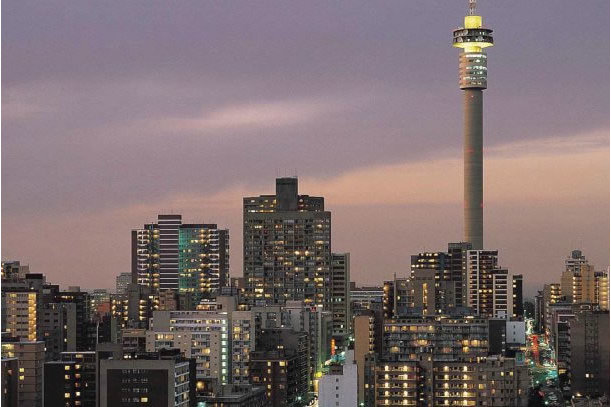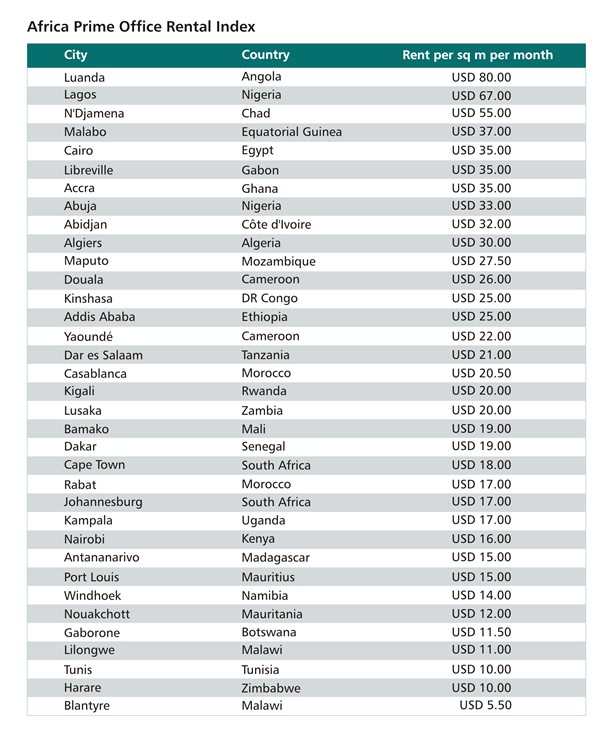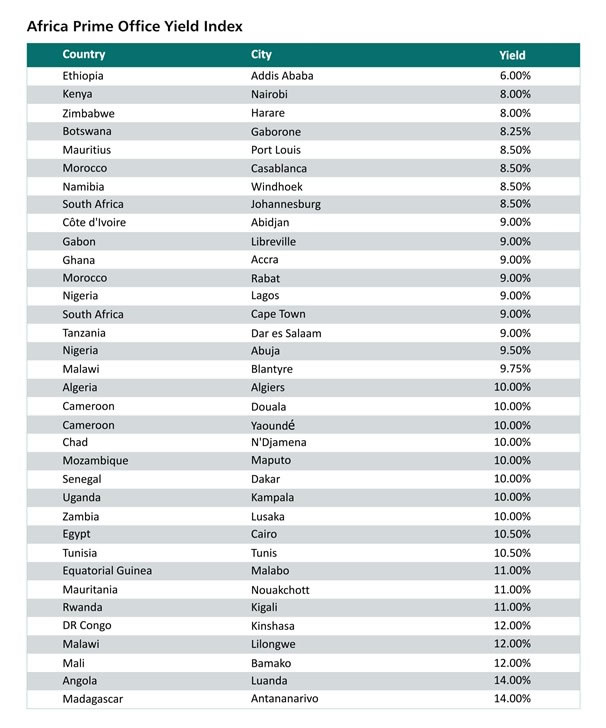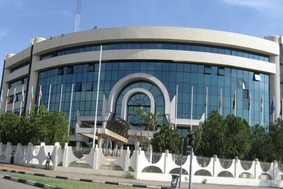Knight Frank report shows divergence in Africa’s real estate markets

Feature Highlight
The report shows the wide variations in the strength of occupier and investor activities across the continent.
A new report by Knight Frank, a London-based global property consultancy, has shown that Africa’s property markets are continuing to develop, despite recent challenges faced by the continent's commodity-exporting economies. The Africa Report 2017, released today, shows the divergence between the growth rates of commodity-exporting and commodity-importing countries and the wide variations it has created in the strength of occupier and investor activities across the continent.
The Africa Report is a biennial review of real estate markets across the continent. It analyses 35 cities in 30 countries. The report includes information on prime rents and yields in the high-end office, retail, industrial and residential property segments for each city/country over the last two years.
For instance, the report's prime office rental index for Africa shows that Luanda, Angola, has the highest office rent per square metre per month of $80; followed by Lagos, Nigeria ($67); N'Djamena, Chad ($55); Malabo, Equatorial Guinea ($37); and Cairo, Egypt ($35). Blantyre, Malawi, has the lowest office rent per square metre per month of $5.5.
Meanwhile, Abuja comes behind Accra in the 8th position on the index, with $33/sq m/month. Office prime rent for Cape Town and Johannesburg in South Africa are $18 and $17, respectively. The Prime rent is the average rent of the top 3-5% of all lettings in each submarket. On the other hand, prime yield is used as a sector benchmark for the return on investment for a fully rented property of the highest physical quality. The Africa office yield index shows that Antananarivo in Madagascar and Luanda have the highest prime yield of 14%, followed by Bamako in Mali (12%), Lilongwe in Malawi (12%), Kinshasa in DR Congo (12%) and Kigali in Rwanda (11%). Addis Ababa, Ethiopia, has the lowest yield of 6%. Lagos and Abuja have office prime yields of 9% and 9.50%, respectively. Cape Town and Johannesburg have yields of 9% and 8.50%, respectively.
Since the collapse in commodity prices in the international markets, the rise of African economies has been interrupted. The continent, which averaged GDP growth of more than 5% per annum between 2000 and 2014, recorded 3.4% growth in 2015, and 2.1% in 2016. Indeed, growth in the Sub-Saharan Africa (SSA) region was estimated at just 1.5% in 2016, according to the International Monetary Fund (IMF).
Peter Welborn, Chairman of Knight Frank Africa, said the real estate demand stemming from oil companies and the associated service supply sector eased in all the African oil-driven markets.
But while commodity-driven economies were negatively impacted by the recent external shocks, commodity-importing East and West African countries such as Tanzania, Ethiopia, Kenya, Rwanda, Côte d’Ivoire and Senegal showed strong performance.
The Knight Frank's Africa Report also shows that there remain grounds for optimism over the longer-term outlook for the continent. Rapid population growth and urbanisation are key drivers of property market activity across SSA. The region’s population is growing at a faster rate than that of any other global region and its demographic profile is both young and increasingly urbanised, creating opportunities for real estate development to support this growth. The report said young urban population could prove to be Africa’s greatest asset in an ageing world.
The continent's retail property segment, a major focus for development activity, is being driven by an expanding middle class. The shopping mall concept has taken root in an increasingly wide range of SSA cities as Nairobi remains an important hotspot for development, according to Knight Frank. The London-based firm said Francophone West Africa has emerged as the new focus for international retailers and developers. In 2015, French multinational retailer, Carrefour, made an entry into Abidjan, Côte d’Ivoire. Carrefour also made its debut in Kenya last year.
“With the increasing demand for the best commercial and residential accommodation coming from the growing African middle classes, there has been an increasing need for developers to raise the quality of the specification in all the new developments,” Welborn said.
One of the highlights of the report is that a growing volume of capital is targeted at SSA real estate investment and development, with a series of new investment vehicles being launched in recent years. South African funds are gaining prominence in this regard as they seek to diversify away from their domestic market – whose growth has been subdued by weakness in the mining and manufacturing sectors.
Knight Frank said recent events have underlined how important it is for investors targeting Africa to gain a detailed understanding of individual markets and to time their market entry correctly.
"Africa continues to offer great opportunities to investors able to navigate the markets astutely and for those with long-term investment horizons," the report stated.
Another opportunity for property investment in Africa is in the warehousing space, where there is increased demand in the region’s key cities for modern warehousing. Several major logistics and industrial parks are in the pipeline such as Rendeavour’s Tatu City near Nairobi and Roma Park in Lusaka. The International Finance Corporation and the CDC Group, the UK’s development finance institution, recently announced they will invest $35 million in Africa Logistics Properties Holding, a Kenyan warehousing firm, to develop modern, grade-A warehousing facilities in Nairobi.
The Africa prime office rental and yield indexes follow.

Other Features
-
At 50, Olajide Olutuyi vows to intensify focus on social impact
Like Canadian Frank Stronach utilised his Canadian nationality to leverage opportunities in his home country of ...
-
Reflection on ECOWAS Parliament, expectations for the 6th Legislature
The 6th ECOWAS Legislature must sustain the initiated dialogue and sensitisation effort for the Direct Universal ...
-
The $3bn private credit opportunity in Africa
In 2021/2022, domestic credit to the private sector as a percentage of GDP stood at less than 36% in sub-Saharan ...
-
Tinubunomics: Is the tail wagging the dog?
Why long-term vision should drive policy actions in the short term to achieve a sustainable Nigerian economic ...
-
Living in fear and want
Nigerians are being battered by security and economic headwinds. What can be done about it?
-
Analysis of the key provisions of the NERC Multi-Year Tariff Order ...
With the MYTO 2024, we can infer that the Nigerian Electricity Supply Industry is at a turning point with the ...
-
Volcanic explosion of an uncommon agenda for development
Olisa Agbakoba advises the 10th National Assembly on how it can deliver on a transformative legislative agenda for ...
-
Nigeria and the world in 2024
Will it get better or worse for the world that has settled for crises?
-
The Movers and Shakers of Nigeria 2023
This special publication profiles 25 people and institutions based on their societal or industry impact in 2023.
Most Popular News
- IFC, partners back Indorama in Nigeria with $1.25 billion for fertiliser export
- Ali Pate to deliver keynote speech at NDFF 2024 Conference
- Univercells signs MoU with FG on biopharmaceutical development in Nigeria
- CBN settles backlog of foreign exchange obligations
- CBN increases capital requirements of banks, gives 24 months for compliance
- Euromonitor forecasts Sub-Saharan Africa GDP to grow to $4.5trn by 2040












